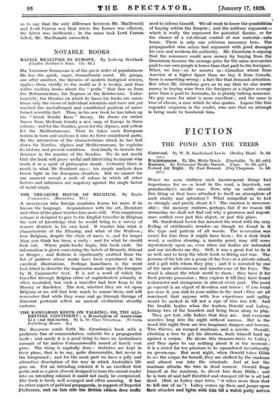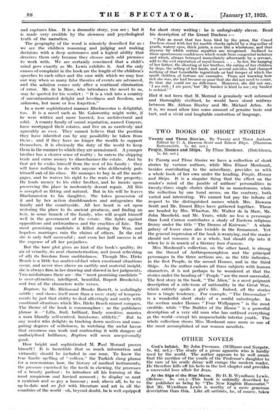FICTION
THE POND AND THE TREES
Blaekrnarsten. By Mrs. Hicks Beach. (Constable. Is. fid. net.) Rapture. By Richmond Brooks Barrett. (Cape. 7s. 6d. net.) Closed All Night. By Paul Morand. (Guy Chapman. 7s. 6d. net.) WHEN we were children such inconsequent things had importance for us—a bend in the road, a haystack, our grandmother's needle case. Now, why on earth should this thing or that have attached to itself an atmosphere of such clarity and splendour ? What compelled us to -feel so strongly and purely about it ? The emotion is irrecover- able ; the memory endures, perhaps, but if we reason till doomsday we shall not find out why a greatness and import- ance settled over just this object, or just this place.
Mr. Sunderland Lewis has invested his wood with the very feeling of childhood's wonder—as though we found in it the type and pattern of all woods. The re-creation WRs. easier for him than it might have been ; for a dark thick wood, a sudden clearing, a marshy pond, may still come mysteriously upon us, even when our bodies are indurated
and our intellects are dry. Still, it was a great feat to do it so well, and to keep the whole book so fitting and true. The persons of his tale are a group of day-boys at a private school, and a girl with whom they play ; and it is narrated by one of the more adventurous and mischievous of the boys. The wood is almost the whole world to them ; they have it for their private possession ; they explore it till they have found
a character and strangeness in almost every part. you pond in especial is an object of devotion and terror ; if you tread too near it, you sink to your ankles in the mud : they are all convinced that anyone with less experience and agility would be sucked in till not a sign of him was left. And the trouble begins when the leaders, Oswald and Lubey, kidnap two of the boarders and bring them along to play.
They get lost, silly babies that they are. And everyone searches long into the night without success. But in the wood this night there are less imaginary dangers and horrors. Two thieves, an escaped madman, and a suicide. Oswald, climbing a tree to get his direction, fords himself hard up against a corpse. He shows this treasure-trove to Lubey ; and they agree to say nothing about it at the moment ; it is a secret far too precious to be squandered incontinently on grown-ups. But next night, when Oswald takes Hilda to see the corpse for herself, they are stalked by the madman and almost run into the criminals. And at last the madman attacks the two in dead earnest. Oswald flings himself at the madman, to divert him from Hilda ; and he is torn at and half throttled and stamped till he- is all but dead. (But, as Lubey says later, " it takes more than that to kill one of us.") Lubey comes up then, and jumps upon their attacker and fights with him till a watch party arrives
and captures him. It is a dramatic story, you see ; but it is made very credible by the slowness and psychological truth of the narration.
The geography . of the wood is minutely described for us : we see the children reasoning and judging and making decisions with a deep seriousness and a logical ability that deceives them only because they choose such odd premises to work with. We are certainly convinced that a child's mind goes exactly as Mr. Lewis exhibits it. And the only causes of complaint in the book are the length of the children's speeches to each other and the ease with which we may lose our way when so many false theories of events arc advanced, and the solution comes only after a continual elimination of error. Mr. de la Mare, who introduces the novel to us, may be quoted for his verdict : " It is a visit into a country of uncontaminated delight and loveliness and freedom, not unknown, but more or less forgotten."
In a more sophisticated manner Blackmarston is delightful, too. It is a novel such as Mr. Galsworthy might write, if he were wittier and more hurried, less architectural and solid. A county family of sound reputation, named Conyers, have mortgaged their estates, and live on as carelessly and agreeably as ever. They cannot believe that the position they have inherited can by any possibility be taken from them ; and if they have no longer the wealth to support themselves, it is obviously the duty of the world to keep them in the manner to which they are accustomed. A younger brother has a clearer sense of reality ; he enters the shipping trade and earns money to disembarrass the estate. And by that act he exiles himself from the rest of his family ; they will have nothing to do with anyone who deliberately puts himself out of his class. He manages to buy in all the mort- gages, and he waives his right to the rents of the property. He lends money to his elder brother, and he insists upon preserving the place in moderately decent repair. All this is accepted as fitting and natural. But in his will he leaves Blackmarston to his daughter. She takes possession of it and by her action dumbfounders and antagonizes the family and the countryside. All her heart is set upon restoring the place to its ancient greatness, and finding an heir, in some branch of the family, who will Acquit himself well in the government of the estate. She fights against oppositions and awkwardness and the cruelties of fate. The most promising candidate is killed during the War, and hopeless marriages ruin the claims of others. In the end she is only half successful ; and even her half success is at the expense of all her prejudices.
But the bare plot gives no hint of the book's quality, its air of veracity, its neat characterization, and (most refreshing of all) its freedom from snobbishness. Though Mrs. Hicks Beach is a little too matter-of-fact when emotional situations occur, and never rises above an earthly and material insight, she is always firm in her drawing and shrewd in her judgments. Two misfortunes there are—the " most promising candidate is over-attractive, intelligent, beautiful, Rupert Brookeish ; and two of the characters write verses.
Rapture, by Mr. Richmond Brooks Barrett, is unfailingly subtle ; and shows itself more than a mere study of tempera- ments by just that ability to deal affectingly and surely with emotional situations which Mrs. Hicks Beach cannot compass. The theme of the book is commonplace : as the publishers phrase it—" Lilla, frail, brilliant, finely sensitive, marries a man blandly self-centred, handsome. athletic." But to any reader who delights in tracking down motives and com- puting degrees of selfislmess, in watching the awful havoc that crassness can work and contrasting it with dangers of undisciplined brilliance, Rapture will seem unequivocally good.
How bright and sophisticated M. Paul Morand proves himself ! It is incredible that so much information: and virtuosity should be included in one man. To know the true Gaelic spelling of " colleen," the Turkish slang phrase for a ceremonious bow, the history of medical instruments, the pressure exercised by the teeth in chewing, the processes of a beauty parlour ; to introduce all his learning at the most auspicious and farcical moment ; to display so neat a cynicism and so gay a humour ; and, above all, to be so up to date and an fait with literature and art in all the countries of the world—oh, beyond doubt, he is well equipped
for short story writing : he is unforgivably. clever. Read his description of the Grand Duchess :—
" Pale as meat that has been bled by the rife* the Crand Duchess stood with her fat marble cheeks upheld by a dog-collar of pearls, watery eyes, -thick joints, a nose like a whetstone, and that shyness by which certain royalties 'are' -recognized. Inclined to those spontaneous confidences which result from congenital isolation and which, always betrayed immediately afterwards by a servant, add to the evil reputation of royal houses. . . . In her, the hanging of her father, the shooting of her brother, the eating of her children by dogs, the selling of her lands, and several suicides, had changed nothing of that formidable ingratitude or 'bad temper of which the spoilt. children of fortune are examples. From not knowing how rich she was, she had become so poor that she did not need to count. So that she could see no difference. Moreover, she did not say. I am rich ; I am poor,' but 'My banker is-kind to me'; my banker is unkind.' " . - Had it not been that M. Morand is 'genuinely well informed and thoroughly civilized, he -would have stood midway between Mr. Aldous Huxley and Mr. Michael Arlen. As it is, we must allow him some amount of genuine taste and tact, and a vivid and laughable contortion of language.











































 Previous page
Previous page